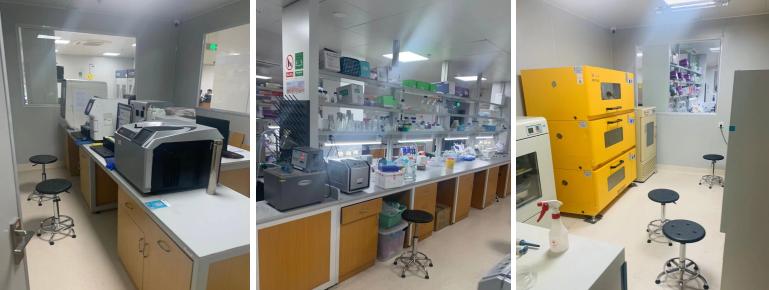In Scotland in 1996, cloning technology began to take shape, and the world's first cloned sheep "Dolly" entered people's vision; in 2018, the pet dog nini from Shanghai used cloning to restart life, and the hot spot of 380,000 yuan of cloned pet dogs was once pushed to the headlines. After more than 20 years of technological evolution, cloning technology from the laboratory to commercialization, China's "shovelers" have enjoyed the help of cloning technology, and more than a dozen pet dogs have been "reborn" through cloning.
36Kr has recently come into contact with "Seaman Gene", which is engaged in commercial animal cloning business, and is a commercial pet cloning enterprise with completely independent intellectual property rights. The company covers the closed loop of animal lifecycle management from genetic testing, gene editing, cell therapy to animal cloning.
The business of Heyman Gene is divided into three categories: pet cloning, providing pet owners with cat, dog, rabbit, small animal cloning, just take out any active cell on the animal, you can clone 99% of the genetically similar animals; animal husbandry edible, race animal cloning, such as Japanese Wagyu cattle, race horse, race dog, race class cattle, etc.; rare animal cloning, rare animal preservation and cloning services for forestry departments, animal protection associations, specific protected animal research institutions, zoos, etc. Many safari parks in the country lack the import qualification to introduce certain rare animals, so such cloning services are urgently needed.
For example, the cloning of the silverback gorilla is one of the next major service items of Hemann Gene, which can see the market demand and the profitability of Heman Gene.
This silverback gorilla belongs to the protected animal, commonly known as the diamond orangutan, mainly distributed in Africa, the country limits the import of only 10 silverback gorillas per year, and the zoo also needs to rely on excellent qualifications to get approval, fierce competition. Seaman gene is breeding silver-backed gorillas through cloning means, it is expected that all research and development costs are nearly 10 million yuan, taking 2-3 years, after the technology matures, the retail price of each can reach 30 million yuan, according to the marginal effect, the second breeding cost only needs 500,000 yuan / only. Seaman Gene said that basically every zoo needs to introduce silverback gorillas, and due to import quota restrictions, the market is in short supply, and it is expected that Seaman Gene will sell at least hundreds of them every year. In addition to the silverback gorilla, Seaman Gene also signed a fixed-point cooperation project with the zoo this year for antelope and zebra, with a cloning order amount of up to 80 million, which is expected to be delivered next year.

Seaman Genetics Laboratory
"The commercial market for animal rebirth is relatively mature, and we have covered this business like many companies in the market; and the breeding of large animals and rare animals is the unique feature of the Heeman gene." Zheng Shidong, CEO of Heeman Gene, shared.
Judging from the market situation, there are many enterprises with mature commercial applications in the field of domestic cloning, such as Boya and Sino Valley, and there are not many competitive enterprises. Compared with competitors, the core feature of Theman gene is to be able to engage in the cloning of large animals and rare animals, which has extremely high qualifications, personnel and technical requirements, and is less covered by competitors.
In particular, rare animal cloning requires high technical capabilities, Seaman Gene CTO has a number of international certifications and domestic and foreign patented technology, has nearly twenty years of biological gene cloning experience, scientific research capabilities ranked in the top three in the national institutions and research institutes, Seaman team has more than fifty doctoral students, so the speed and success rate of research and development are relatively high. The company has established project cooperation with four scientific research institutes such as Fujian Normal University, and is a biological cloning cooperation institution of Fujian Normal University, and Professor Chen Qi, who cooperates with Ximan Gene, is the director of the Fujian Provincial Key Laboratory of Natural Immunobiology and the deputy director of the Southern Biomedical Research Center. On the other hand, rare animal cloning also has strict license qualification requirements, and Seaman Gene has obtained a wildlife breeding license for Class I and Class II protected animals, while no other company in the world has obtained such qualifications.
The image comes from Visual China
In order to promote the progress from scientific research to commercialization, the founding team set up three independently operated subsidiaries under the head office Seaman Holding Group, namely Seaman Pet Clone Sales Company, Seaman Genetic Research Institute, and Seaman Gene Bank. Zheng Shidong, CEO of Heyman Gene, said that the subsidiary is a newly established company by the team to promote commercialization, because there is no expenditure on basic research in the early stage, and only needs to bear the research costs of a single project, so the cost is low.
At present, Heyman Gene has cooperated with more than 600 high-quality pet hospitals across the country to set up a designated hospital for Pet Clone to carry out marketing promotion of pet dog cloning, cell preservation, genetic testing and other businesses.
From the perspective of market performance, Heeman Gene has strong profitability, and in 2020, the completion of the pet cloning platform and the large animal cloning platform have achieved annual market revenue of more than 10 million yuan. The antelope and zebra cooperation project signed with the zoo this year has reached 80 million cloning orders and is expected to be delivered next year.
In order to promote the development and marketing of the national market, Heman Gene is carrying out financing, with a target financing amount of 10 million yuan, mainly for research base and breeding base investment, team operating costs, network marketing, marketing and so on.